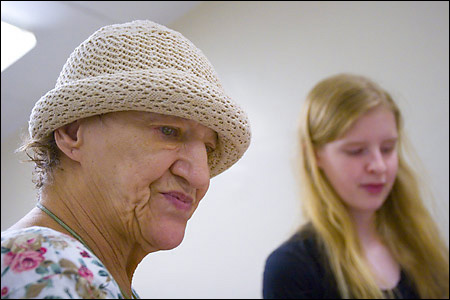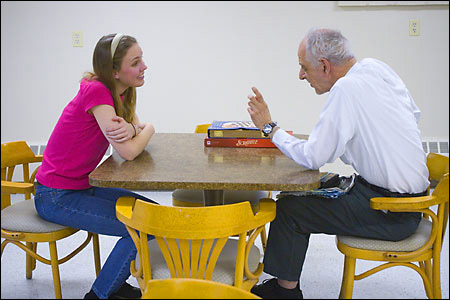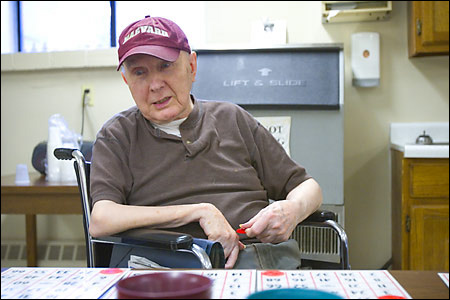PBHA volunteers play bingo with their elders
Marcia Gray, 67, lives at Vernon Hall, a nursing home on Dana Street, five minutes by foot from Harvard Yard. She has been there two years. In her room, Gray said, she has a television with no picture, and a radio with no lights, “but it still gives good music.”
Years ago, her group home visited Harvard, where Gray said she got $20 and a rose for reciting a poem. “It was called ‘The Empty Shell,’” said Gray. “I wrote it about myself.”
Gray isn’t sure how old she is, or where she was born. She thought maybe Italy. She thinks her parents and siblings were killed by bombs, and a family from Hyde Park, Mass., adopted her. But Gray does remember her first job as a young woman. She worked as an aide in a veterans hospital, where she brushed her clients’ teeth, washed their faces, changed their sheets, and brought them ice water.
In a small way, Gray is being paid back for her bedside kindnesses decades ago. Every Saturday afternoon, she’s among a group of Vernon Hall regulars who play bingo in the home’s recreation room. Calling the numbers and checking the cards are undergraduate volunteers from Harvard.
“They’re so sweet,” said Gray, perched in her Tuff Care wheelchair in a winter cap, flower-print dress, and blunt sneakers. “I love seeing these girls come in.”
“These girls,” among others, are Cathy Cheng ’07, Katie Atnip ’07, and Katherine “Katie” Grosteffon ’09. They belong to the Elderly Affairs Committee, one of the student volunteer organizations under the Phillips Brooks House Association (PBHA) banner.

There are 72 active PBHA public service groups, but only a few serve the elderly directly, said Kerry McGowan, one of four PBHA directors of programs.
Other PBHA volunteers get some contact with the elderly, including student work with a homeless shelter, but it is limited, he said. The Elderly Affairs Committee that Cheng co-directs has 30 volunteers, making it the largest of the three PBHA organizations that serve the aged.
The Pets As Therapy program has 15 volunteers, and makes weekly visits to Boston-area nursing homes. Alzheimer’s Buddies for the Arts, based on the idea that creating art mitigates early-stage Alzheimer’s, just started in spring 2006.

“It’s true that a lot of PBH programs deal with children,” said McGowan. “But I don’t think we need more programs (for the elderly), necessarily – just more volunteers.”
Cheng, a Leverett House honors biology concentrator from Illinois who’s applying to medical schools, became co-director of the Elderly Affairs Committee in the second semester of her freshman year. In less than three years, she helped triple the group’s number of volunteers and double its number of programs. Besides visits to Vernon Hall – where volunteers supervise bingo, chat with residents, and even paint nails – the committee has a “one-two-one” match-up program: One volunteer is matched for two hours a week with one older person still living independently, to help with letters, e-mail, or grocery shopping.
Cheng, who plans on specializing in geriatrics, regrets growing up thousands of miles from her elders in Taiwan. “I never had the privilege of visiting my grandparents regularly,” she said.

Inspiration to work with the elderly came early, on a visit to a nursing home as a second-grader, where she saw an old man, who was blind, seated alone in front of a television.
“I realized: They must have a really bad life at a time when they should be enjoying it the most,” said Cheng, 21. American culture tends to neglect older citizens, she said, despite all “the good humor, advice, and perspective” they can offer.
When she was a freshman, said Cheng, “Vernon Hall residents were among the first friends I made.”
In the recreation room, Atnip – co-director of the Elderly Affairs Committee – played Scrabble with a resident who disdains bingo.

Atnip, a 21-year-old history and science concentrator from Tennessee, lives in Quincy House and plans on a career in medicine. One summer, she worked at a rural Tennessee nursing home and befriended a woman who, until a few years before, was heating her house with wood and drawing water from a well.
“I’m a history buff,” she said, adding that “amazing stories” are often the reward for listening to the elderly. “You give a lot of yourself, but you get a lot back.”
Niraj Nathan, a 19-year-old Cabot House biology concentrator from Florida, agrees. “You get a lot out of it,” he said of working with the elderly, “as well as giving to the community.”
For more on PBHA, or to volunteer
Nathan likes the flexibility of working with the Elderly Affairs Committee. As a one-two-one match-up volunteer, he can set his own hours. His present client is an older man who has suffered a stroke. Once a week, Nathan takes walks with him, and reads him the newspaper – activities that supplement the older man’s rehabilitation.
Not all volunteering has to be about big world issues like hunger or poverty, said Nathan. “Small services make a big difference.”
At Vernon Hall’s longest bingo table, Gerald Sullivan, wearing a Harvard baseball cap, sat in his wheelchair, in command of six bingo cards and a pile of chips. “The table is always crowded doing this,” he said, surveying five other players. The 85-year-old retired civil servant called the volunteers “very generous.”
During an hour of bingo, Grosteffon – a 20-year-old Currier House biomedical engineering concentrator from Michigan – sat with three residents, all of them in wheelchairs.
For some student volunteers, “there’s more appeal to working with children,” she said. “After all, we’re closer to childhood.”
But Grosteffon grew up listening to her great-grandfather’s stories of the Great Depression and World War II, and volunteered in nursing homes while in high school. “The people I visit every week have become my friends,” she said of her second year of work at Vernon Hall. “I look forward to seeing them.”
To her left at the table was Seth Adams, who is blind. One week at bingo, Grosteffon said, Adams won four games. “He told me: ‘Eighty-seven years of life, and my luck is just beginning.’”
To her right was Marcia Gray, whose macular degeneration makes getting the chips in place difficult. Handling the chips was difficult for a lot of the players. Competing with the noise of the turning wire basket of bingo balls was the sound of chips dropping on the linoleum floor.
The third player at Grosteffon’s table was Austin Oliver Elder Jr., a 71-year-old who grew up in Cambridge and served in the Army during the Korean War. Before moving into Vernon Hall two years ago, he worked in candy factories, made pet mattresses, drove an ambulance, did janitorial work, and drove a cab.
Except for bingo once a week, courtesy of the Harvard volunteers, life is pretty plain but not lonely, said the man who still keeps his childhood nickname, “Moose.” “We’ve got certain guys we hang out with,” said Elder, with a twinkle, “like a gang.”
The volunteers bring freshness to Vernon Hall. “They’re beautiful,” he said, pushing a button to back his wheelchair away from the table. “If we didn’t have them, we’d have nothing.”




